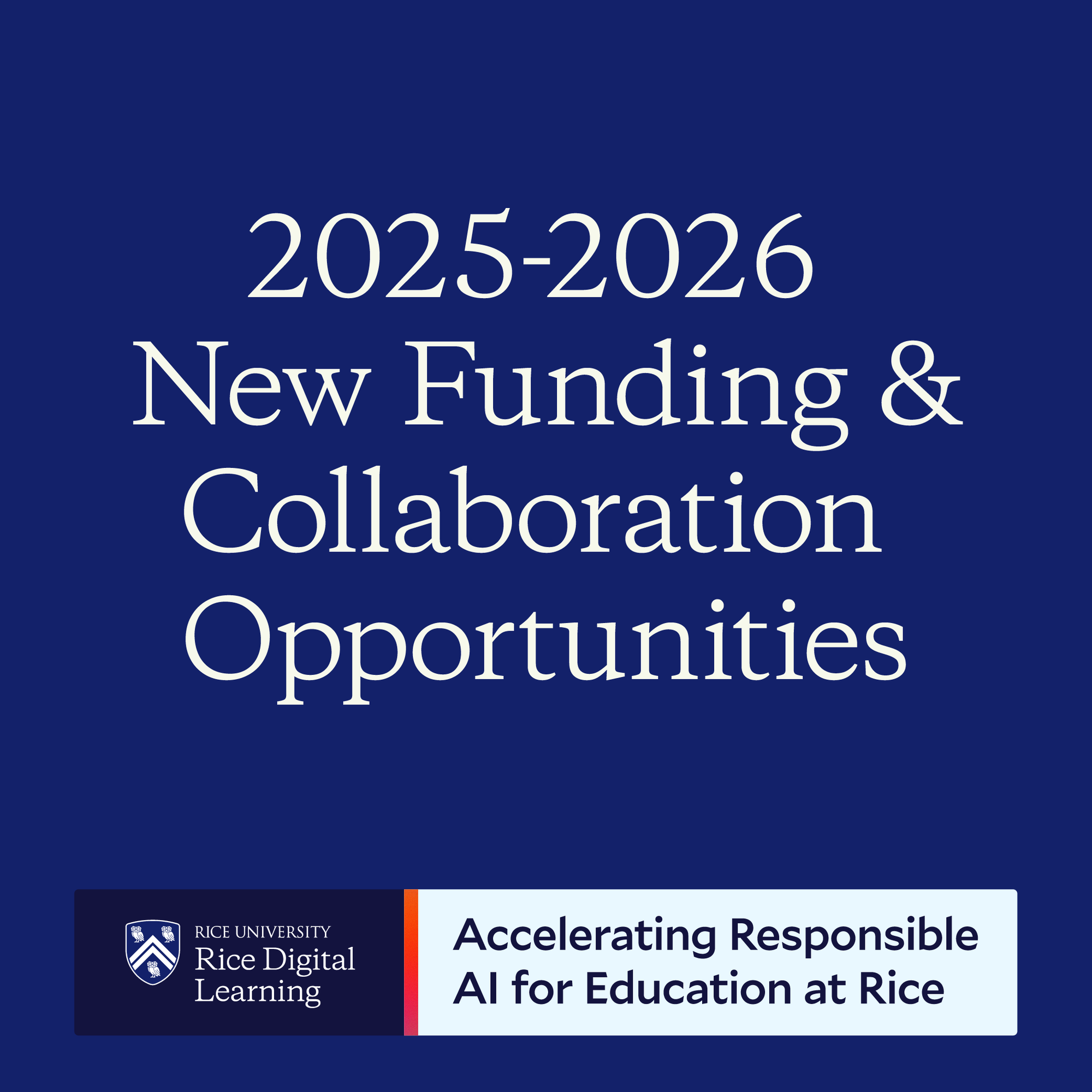
Guidelines &
Resources for
Faculty & Staff

Call for Participation: Accelerating Responsible AI for Education
Submit Funding Request Today
Aligned with Rice’s Momentous strategic plan, the Office of Digital Learning and Strategy is launching a new initiative: Accelerating Responsible AI for Education at Rice. The program is designed to spark innovation, strengthen our faculty community, and position Rice as a leader in the evolving age of AI.
Learn more about each of the four programs and submit your proposal
Rice-Supported AI Tools
Tools Available for Teaching, Research, & Operations
Rice University provides access to several AI-powered tools to support instruction, research, and administrative work. Use of these tools should follow Rice’s guidelines for responsible use, data privacy, and attribution.
Google Gemini NotebookLM Grammarly Zoom: AI Companion Microsoft Copilot (formerly Bing Chat Enterprise)If you encounter any difficulty logging in, please contact the OIT Help Desk.

Using AI in Courses & the Workplace
Guidance for Teaching, Learning, & Workplace Practices
Find recommendations for using AI responsibly in teaching and operations. Access sample syllabus statements, tips for setting student expectations, and university policies on AI in the workplace.
AI in Teaching & Workspaces:
Teaching with Technology Resources through Canvas The Rice Honor Council’s General AI Policy Generative AI Guiding Principles and Sample Syllabus Statements Introduction to AI for Education at Rice Canvas Resource Faculty Recommendations for Mitigating and Combating Unauthorized A.I. UseInstitutional Policies on Responsible Use:
Protection of University Data and Information Policy Appropriate Use of Information Technology Policy Research Data Management Policy Research Integrity PolicyTool Guidance:
Zoom: AI Companion Zoom: How to Prevent and Remove Unapproved AI bots from Zoom Meetings
Research & Innovation Opportunities
Funding, Pilot Programs, & Project Support for Faculty & Staff
Rice faculty and staff can explore AI applications through institutional pilot projects, innovation initiatives, and proposal-based funding.
Ivy AI Chatbot Deployments Ken Kennedy Institute Research Clusters Rice AI Venture Accelerator (RAVA) Custom AI Projects with TT&I Collaborative Research with the AI Advisory Committee AI Houston Rice Engineering and Computer Department of Computer Science Robotics & Physical AI Ken Kennedy Institute AI and Computational Biology for Health
Events & Activities
FAQs: For Faculty & Staff
Q: What AI tools are supported by Rice?
A: The university provides access to tools like Grammarly, Zoom: AI Companion, Microsoft Copilot (formerly Bing Chat Enterprise), Gemini, and NotebookLM. Use must follow Rice’s AI Usage Guidelines and tool-specific support documentation.
Q: Can I use AI-generated images or text in my teaching?
A: Yes, as long as content is accurate, relevant, and properly attributed. You should disclose use to students and align with instructional goals. For best practices, refer to Responsible Use Guidelines.
Q: Where can I find guidance on AI expectations for students?
A: See the syllabus statement recommendations and levels of adoption developed by Rice’s Center for Teaching Excellence page for further guidance.
Q: Should I allow AI tools like ChatGPT in my classroom?
A: At Rice, instructors are advised to include clear policies in syllabi and facilitate discussion on appropriate use, ensuring AI enhances, rather than replaces, student learning. See the Syllabi Resources page on the Center for Teaching Excellence for further guidance.
Q: How do I prevent overreliance on AI and preserve critical thinking?
A: Educators in higher ed emphasize co-using AI as a collaboration tool — not a replacement for thinking.
- Requiring students to submit AI prompts
- Using AI for feedback loops (e.g., drafts), not final output
- Designing assignments where personal reflection and analysis matter
Suggestions for incorporating this technology into your teaching are available in Module 3 of Teaching with AI at Rice: From Curiosity to Confidence developed by Rice Digital Learning & Strategy.
Q: Are there privacy or ethical risks to be aware of?
A: Yes. Most public AI tools collect user inputs to improve their models, which means information entered may not remain private. Faculty and staff should avoid entering any sensitive, confidential, or personally identifiable information—such as student records, unpublished research, or internal communications—into these platforms. For guidance on appropriate use, review Rice’s AI Usage Guidelines, which outline expectations for responsible data handling, attribution, and tool selection.
Q: How accurate and reliable are AI-generated answers?
A: AI systems can produce confident-sounding but incorrect information. It’s important to verify AI outputs and not present unverified content as fact.
Q: What’s Rice’s stance on AI policies and integrity?
A: Rice takes an “open yet cautious” approach to generative AI—encouraging exploration while safeguarding academic integrity, equity, and data privacy. Faculty are encouraged to develop discipline-specific guidelines, include clear expectations in syllabi, and consider the impact of AI use on fairness and learning outcomes. You can read the full Faculty Guidance on Generative AI from the Office of the Provost.
Q: How do I get started with integrating AI in my teaching?
A: Rice offers several ways for faculty and staff to begin exploring and using AI tools responsibly in teaching, research, and administrative work:
Start with the Introduction to AI for Education at Rice Canvas resource, developed by Rice’s Teaching & Learning Technologies, OIT, which provides a foundational overview of AI concepts, terminology, and Rice’s guidance.
Explore Teaching with AI at Rice: From Curiosity to Confidence Canvas course, developed by Rice Digital Learning & Strategy, a self-paced course designed for Rice faculty and staff offering practical strategies, classroom examples, and resources for integrating AI into your instruction.
For continued learning, subscribe to the AI Education newsletter to receive updates about workshops, events, and new training opportunities.
Q: Who can I contact for support?
A: Email the Center for Teaching Excellence at teaching@rice.edu for help integrating AI into coursework.
For Canvas support and integration contact the Teaching & Learning Technologies, OIT team.
For project ideas, pilot programs, or research collaborations consult Rice’s AI Advisory Committee education leads (Shawn Miller, Carissa Zimmerman).
Note: For full policies, procedures, and support materials regarding academic integrity and AI-related concerns, please visit the Rice University Honor Council website. Faculty are encouraged to review the latest guidance and reach out directly for case-specific questions or clarification.
The Rice Honor Council’s General AI Policy

